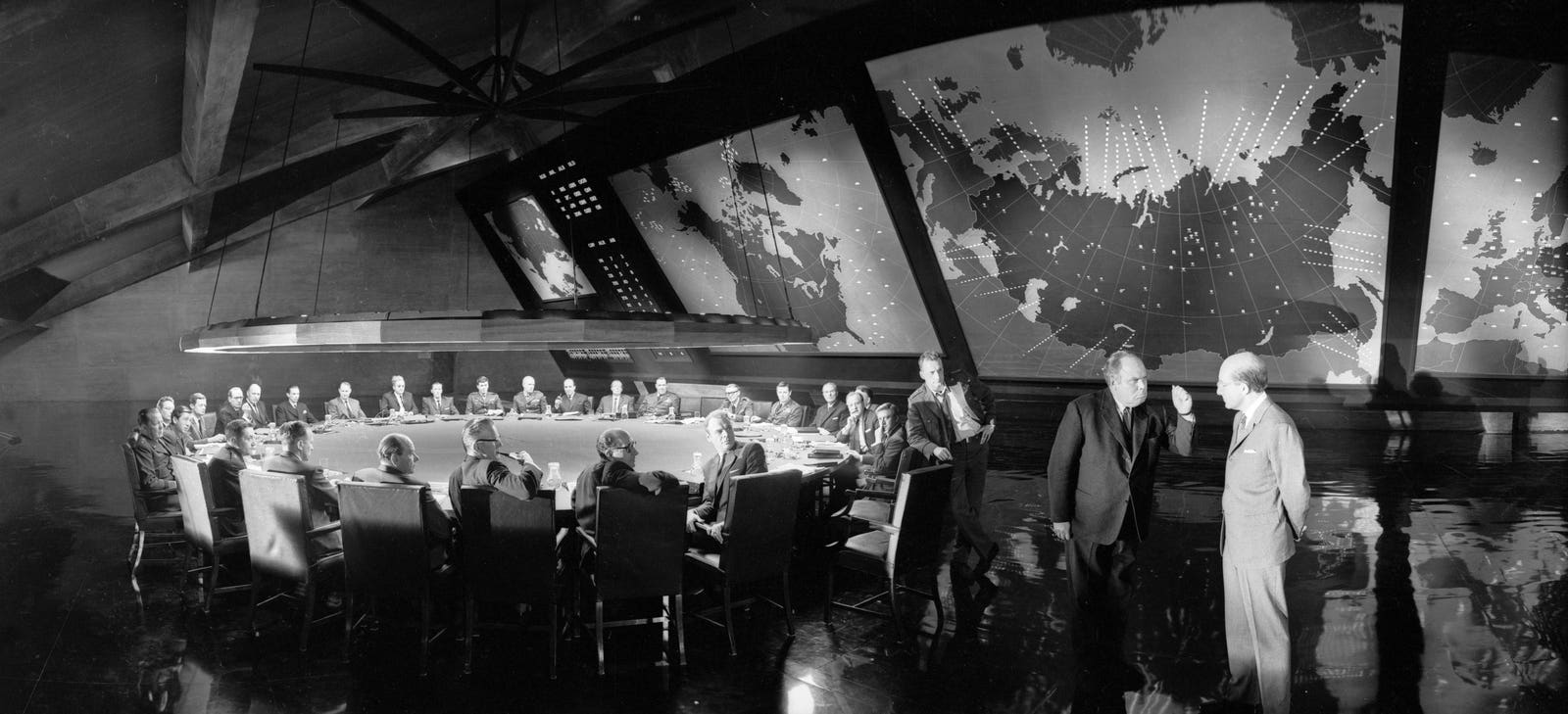14th March 1963: Filming on the set of ‘Dr Strangelove or: How I Learned to Stop Worrying and Love … More the Bomb’ directed by Stanley Kubrick. From right to left : Peter Sellers (1925 – 1980) as US President Merkin Muffley, Peter Bull (1912 – 1984) as Ambassador de Sadesky and George C Scott (1927 – 1999) as General ‘Buck’ Turgidson. (Photo by Express/Express/Getty Images)
Getty Images
My friends in the French Air Force tell me (by Signal obviously) that last Tuesday’s ‘Poker 2025’ nuclear attack exercise went off well. Rafale fighter jets loaded with mock nuclear missiles took off from bases in Brittany, supported by Mirage fighters, refuelling and signals planes, in order to stage an attack on the southern part of France, which in this simulation was defended by a host of other air forces (i.e. Poland).
This was the first ‘Poker’ exercise in four years and comes at an opportune time for France to demonstrate its nuclear capability to other EU states, and to up the ante in terms of the defence debate in Europe. More alarmingly, America’s retreat as the guarantor of international security, and Russia’s aggression of Ukraine and Europe, not to mention the darker intentions of Iran and China, have prompted a range of countries – from Poland to Australia to debate whether they need a nuclear deterrent.
Acquiring or building nuclear weapons is one thing, figuring out how and when to use them is another. In 1983, a potential nuclear exchange was averted when an officer in the Soviet Air Defence Force, Stanislav Petrov, correctly assessed that a signal of an incoming missile attack was a false alarm and did not trigger an urgent warning to his chain of command. Also, in 1962 the Bay of Pigs standoff between the US and Russia came dangerously close to a missile exchange between the superpowers (book ‘The Kennedy Tapes’ is well worth reading).
In this context, it is also time to resurrect the film ‘Dr Strangelove’, a Stanley Kubrick movie that hinges on the dilemma of a first strike nuclear attack by the US on Russia. The central character in the movie, played brilliantly by Peter Sellers, is thought to have been based on Johnny von Neumann, a brilliant Hungarian-American polymath, who passed through some of the world’s most prestigious schools (ETH Zurich, Gottingen and the Institute for Advanced Studies at Princeton) and was a significant contributor to the US atomic weapons program.
One of von Neumann’s accomplishments was the founding of game theory – the modelling of strategic decision making. The logic of Dr Strangelove turns around the game theoretic problem that could be described as ‘if I think my nuclear armed opponent might think I AM going to strike him, and he might react, then I had better strike him first’.
Game theory has become an important part of economics since von Neumann’s work and is also very useful in international relations. It may enjoy a revival in the context of the second Trump presidency (a couple of weeks ago in ‘Brexit to Dixit’ I invoked the work of another Princeton resident, Avinash Dixit, on real options theory, which is helpful in explaining how policy uncertainty is impacting investment decisions).
Game theory helps to explain why the world was so stable during the period of globalisation – the international landscape was dominated by a large, predictable and mostly benevolent ‘actor’ (USA) in the context of a host of other less powerful actors. The advent of a new, powerful, self-interested actor (China) changed the nature of the international ‘game’ (as popularised in books like Graham Allison’s ‘Destined for War‘). The immediate process of the transformation of the US into a singular, potential revisionist power, is generating enormous volatility.
The reason that game theory will be in vogue in international relations is that the assumptions behind the dominant player in the game, the US, are already radically changing, as witnessed by comments this week from Mark Carney the Canadian prime minister.
The US may no longer be dominant (a powerful nation-state rather than an empire), it could be more adversarial rather than benevolent and generally unpredictable. In the game theory framework, such a view of the US as an actor on the international stage could prompt other nations to take hitherto unthinkable actions – Japan might build a nuclear weapons program (it has the wherewithal to do so quickly) and provide this to South Korea, China might decide to bolster its soft power by underwriting health and poverty programs for the UN, and Europe may offer its citizens a secure, private social media service (not unlike the WeChat suite).
Next week’s Liberation day (April 2) tariff announcement will play a role in the transformation of the US in the eyes of its allies and neighbours, and a game theoretic response is that we see much greater coordination between Japan, the EU, UK and Canada around their collective trade and economic relationship with the US.
